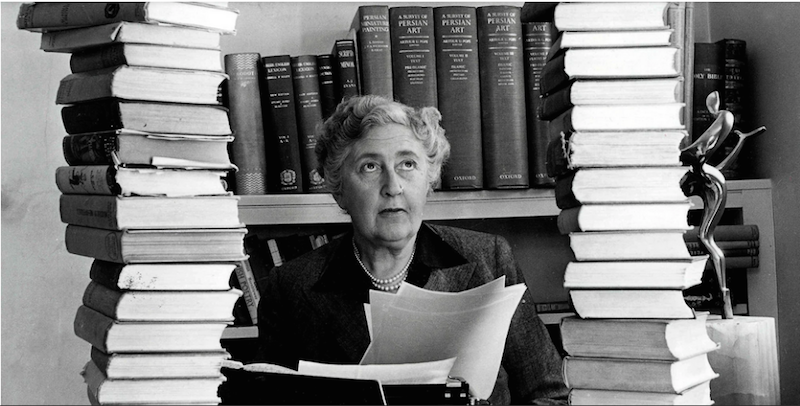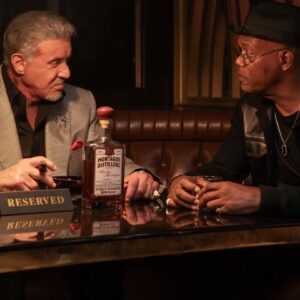A couple of years ago, I quit my job as a tech journalist and moved to the desert to open a bookstore.
My reasons were mostly to do with burnout: The dread of waking up every morning wondering what new awful thing Musk or Zuck had done to the world. The 2am text messages from editors demanding 800 words on each new atrocity, the inevitable social media fights that followed publication.
Opening a bookstore has given me some much-needed distance from the news. But, ironically, it has also made me much more keenly aware of how world events are affecting others.
It turns out you can tell a lot about the mental health of a nation by the books people buy.
I don’t just mean the obvious stuff. Unsurprisingly, prior to last November’s election, books about democracy and the past misdeeds of candidates (one candidate in particular) flew off the shelves. After the votes were tallied, we sold a lot of books about tyranny and the practicality of moving abroad. As the rights of women, immigrants, LGBTQ people have been eroded so we have seen a spike in sales of books about social justice.
And then there’s Agatha Christie.
At first I thought the increase in sales of Christie novels last November was just a seasonal blip. I mean, she is the bestselling author of all time and even in our small thousand square foot store, it wasn’t unusual to sell a couple of her books a day. We had also just received a particularly fancy hardcover edition of The Murder of Roger Ackroyd that made a great holiday gift. But when we started moving five, or ten, or more Christies a day – across her entire canon – I knew something had shifted.
And not just for Agatha. Since last year’s election, our monthly sales of mysteries and thrillers have more than doubled compared to the previous two years. Books by PD James and Louise Penny have sold in record (for us) numbers, accompanied out the door by bucketloads of Crichton and Baldacci. After gently grilling the customers buying them, I was surprised how many were either new to the mystery/thriller genres or rediscovering it after years away.
Also surprising was that almost all of them cited the same two reasons for wanting to read crime fiction.
The first reason is obvious: We read mysteries and thrillers to escape. This is something Agatha Christie understood about her own books. It’s why, despite writing so many books during the Second World War, Christie barely mentioned the fighting or the Blitz, apart from one Tommy and Tuppence novel – N or M? – and a couple of short stories. For a similar phenomenon today consider how little any of us want to read novels that mention Covid. Whodunnits – especially those set in fancy houses or cozy villages – transport us to a world away from bombs falling and jackboots on the streets.
But plenty of genres – romance, sci-fi, historical fiction – offer escape. And wanting to forget reality doesn’t explain why contemporary mysteries and thrillers, including ones featuring corrupt tech bros and nefarious politicians are also selling in large numbers. We have sold more than 100 copies of Gustaf Skördeman’s Geiger, a thriller about cold war spies wreaking modern-day havoc; and several dozen copies of Ruth Ware’s One by One featuring a cast of entitled and possibly murderous tech founders. Why the hell would anyone want to read about those things in fiction when they can just switch on CNN?
Because the second thing readers find in crime novels is justice. Law, and order. It’s not a spoiler to say that in both Geiger and One By One, the crimes are solved in the end, and the baddies punished – just as they are in (almost) every Agatha Christie story. We are living in a world where justice seems like a relic of the past – where comically evil people lie, cheat, and kill with seeming impunity. What a pleasure to read a story in which a sensible old lady or a Belgian refugee strides into the chaos and straightens it all out, ensuring the bad guys are punished and the victims get justice. Don’t we all deserve some of that in our lives?
To that end, here (according to our point of sale system) are seven of the top ten mysteries and thrillers bought by our customers since last November…
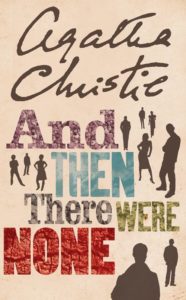
And Then There Were None by Agatha Christie (and other Agatha Christies)
As expected, Agatha remains the queen of crime sales – so much so that I’ve had to combine them into one entry so she doesn’t crowd everyone else out. Of all of her titles, And Then There Were None tops our sales charts, because if seeing one criminal getting their comeuppance is refreshing, then ten is pure bliss. Especially when it takes place on the ultimate escape from reality: The remote island.
Other Christie bestsellers include The Murder of Roger Ackroyd (an industrialist gets the knife) and A Murder is Announced (an immigrant as fall-guy for a real crook). I’ll let readers decide why those in particular might be so popular.
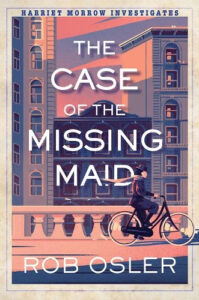
The Case Of The Missing Maid by Rob Osler
Osler’s breakout third novel has been flying off the shelves. It follows Harriet Morrow, a brilliant, non-binary crime-solver working in a male-dominated detective agency in 1890s Chicago. Aside from being a delightful whodunnit with echoes of Christie’s Clapham Cook, the novel deals with immigration, sexuality, gender discrimination, and class – reminding us that the more things change, the more they stay the same. (Sidenote: If Morrow doesn’t get her own PBS series soon, there’s no justice.)

Two Nights in Lisbon by Chris Pavone
On the face of it, a superb by-the-numbers thriller. A woman wakes up and finds her husband has vanished from their hotel room. There’s a conspiracy, long-hidden secrets, betrayal and some killer twists. But, by giving the story a female protagonist in place of the usual ass-kicking male action hero, Pavone nudges the typical “dad thriller” reader to consider why the men she encounters in the story (particularly those in authority) are so reluctant to believe her. When was the last time you saw Reacher get gaslit in that way?

The Problem of the Wire Cage by John Dixon Carr
Re-issued by American Mystery Classics last year with a new introduction by Rian Johnson, this classic impossible mystery features a body found in the middle of a locked tennis court, killed by a murderer who has left no footprints. The plot is pure Dixon Carr escapism as is the assurance that even the most hopeless and inexplicable situation can have a satisfying and logical resolution.
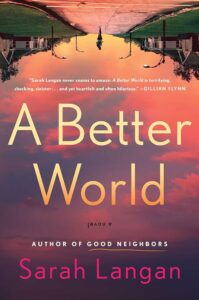
A Better World by Sarah Langan
Corporate weirdos promising Utopia – perfect food, clean water, big beautiful schools – with a side of sinister religion. Sound familiar? And yet Langan’s thriller – which manages to be both propulsive and creepy – still offers the possibility of escape. Side note: As I look down this bestseller list, it’s interesting how many of our most popular mysteries and thrillers feature a female protagonist who’s forced to clean up everyone’s mess.
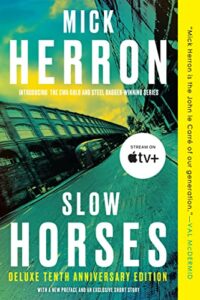
Slow Horses (and other Slough House novels) by Mick Herron
Speaking of cleaning up messes, my favorite thing about Herron’s spy series is the dynamic between perpetual schoolboy Jackson Lamb and the grown-up (but no less flawed) Diana Taverner. Talking to customers, though, the real appeal of the series is seeing a succession of corrupt politicians, far-right ideologues, and FSB assassins taken down by Lamb’s rag-tag mob of office drones. It’s like Office Space with polonium on the doorhandles.
Bonus:
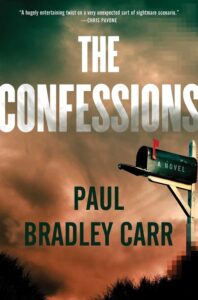
The Confessions by Paul Bradley Carr (sorry)
Ok, this one’s a cheat. My own novel, The Confessions (published July 22nd from Atria), is already an in-store bestseller, largely because I’ve been pre-selling it like crazy. Still, it fits neatly on the list, with the escapism of a murder mystery and the bad guy comeuppance of a thriller. The story was inspired by my two decades covering the worst of Silicon Valley and begins when the world’s most powerful AI becomes sentient and realizes all the terrible crimes it has helped its users commit. Wracked with guilt, it decides to shut itself down, but not before sending millions of letters in the mail confessing humanity’s greatest sins. The only person who can save the world from the resulting chaos? A bookselling ex-nun who originally taught the AI about right and wrong by reading to it from… Agatha Christie.

